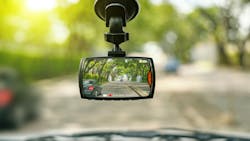Study finds drivers’ accident recall is severely lacking, highlighting dashcam benefits
U.S. drivers can’t recall 68% of key information following a crash, according to dash camera company Nextbase. A recent study by the provider found that “no drivers could remember all vital information after witnessing a road incident,” and 44% of drivers “failed to identify the car at fault for a traffic incident.”
This lack of total recall from motorists across the U.S. could have big ramifications for the trucking industry.
Key findings from the Nextbase study:
- Only 1% of drivers could accurately recall all necessary details after a collision.
- Nearly half (44%) of the 66 drivers surveyed failed to identify the car responsible for the accident.
- One-third (33%) of the drivers displayed distracted driving behaviors.
- On average, men were able to recall 34% of crucial accident information, whereas women recalled 30%.
- Two participants (3%) recalled the full license plate of a car shown during the test.
Accidents that aren’t caused by truck drivers often fall into two categories: “unfairly accused drivers and fraudulent claims involving insurance scams,” Carolyn Mason wrote in a post for Mack Trucks’ Bulldog magazine. Installing dash cameras inside trucks can help lower the risk of both.
“The ability to validate the facts surrounding an incident quickly and accurately helps keep our drivers behind the wheel,” Craig Bennett, safety director for Waste Management, said in the post.
See also: How dash cams, driver coaching tools could help fleets reduce costs
How well do drivers recall accidents?
The study included a focus group of 66 U.S. adults between 21 and 42. The group was quizzed on five video clips of real-life crashes. Participants were shown one clip at a time followed by a five-question quiz to determine their ability to recall key aspects of an accident.
On average, men recall more details of an accident than women, recalling 34% of details compared to women’s 30%, the study showed. Additionally, only two of all 66 participants recalled the full license plate of a car shown during the test.
What’s more, only 56% of the drivers surveyed could correctly identify the car and driver responsible for the accident, meaning nearly half could not correctly identify who was at fault. Further, a whopping 29 of the 66 participants blamed the wrong driver, and 67% of drivers couldn’t even identify the color of the car driving in front of them.
After analyzing the study results, Nextbase deduced that distracted driving could be to blame for drivers’ inability to recall key details of traffic accidents. Questions that helped come to this conclusion pertained to whether a car used indicator signals. When asked this question, some participants admitted to entirely missing the indicator or being distracted by something else, Nextbase reports.
“Accidents out on the road can come as a shock, and you can never anticipate a collision occurring,” Booker stated in the study’s report. “Our study demonstrates that when you rely on your memory alone, it is easy to forget or miss a lot of critical information which may be needed for insurance or legal purposes.”
See also: Summertime reminder: Most drivers aren’t professionals
How dash cameras can prevent wrongful blame
Without reliable information from motorists, it’s essential that trucking companies employ safety nets in the form of dash cameras. This ensures that all necessary details of an accident are recorded through an unbiased source that can’t make recall mistakes.
“A tool that can be incredibly useful in the event of a road-related incident is a dashcam,” Booker said in the report. “The main benefit is that it immediately removes the need to solely rely on your memory to recount all the specifics of an incident in or around your car. Anything that happens is immediately captured and is ready and waiting for you to watch back and discover anything that you might have missed.”
See also: Fontana: Cameras and fleet safety
A 2019 poll from Samsara indicated that 50% of the company’s fleets have used dash camera footage to exonerate a driver within one year. That helped save Samsara customers $5,000 to $25,000 on average. Samsara’s poll also revealed that “exonerating innocent drivers from blame is one of the most powerful ways to get driver buy-in for dashcams,” and that 93% of its customers have found that dash cameras have not negatively affected their driver retention.
About the Author
Jade Brasher
Senior Editor Jade Brasher has covered vocational trucking and fleets since 2018. A graduate of The University of Alabama with a degree in journalism, Jade enjoys telling stories about the people behind the wheel and the intricate processes of the ever-evolving trucking industry.

